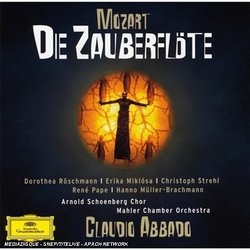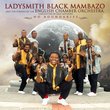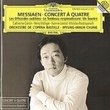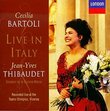| All Artists: Wolfgang Amadeus Mozart, Claudio Abbado, Mahler Chamber Orchestra, Arnold Schoenberg Chor, Rene Pape, Dorothea Roschmann, Erika Miklosa, Christoph Strehl, Hanno Muller-Brachmann Title: Mozart: Die Zauberflote (The Magic Flute) Members Wishing: 0 Total Copies: 0 Label: Deutsche Grammophon Original Release Date: 1/1/2006 Re-Release Date: 6/13/2006 Genre: Classical Styles: Opera & Classical Vocal, Historical Periods, Classical (c.1770-1830) Number of Discs: 2 SwapaCD Credits: 2 UPC: 028947757894 |
Search - Wolfgang Amadeus Mozart, Claudio Abbado, Mahler Chamber Orchestra :: Mozart: Die Zauberflote (The Magic Flute)
 | Wolfgang Amadeus Mozart, Claudio Abbado, Mahler Chamber Orchestra Mozart: Die Zauberflote (The Magic Flute) Genre: Classical
This live Magic Flute is delightfully, lightly led by Claudio Abbado. Even the opera's darker moments---the scenes at the Temple, etc.---are treated nimbly; there's no hint of Otto Klemperer's approach to be found here. Th... more » |
Larger Image |
CD DetailsSynopsis
Amazon.com This live Magic Flute is delightfully, lightly led by Claudio Abbado. Even the opera's darker moments---the scenes at the Temple, etc.---are treated nimbly; there's no hint of Otto Klemperer's approach to be found here. The Papageno is somewhat faceless, and while the Queen of the Night sings accurately and delivers her recitatives with real drama, she, too, is not up to the best on discs. But the recording sports the finest Tamino since Stuart Burrows and Fritz Wunderlich in Christophe Strehl, a tenor with both lyricism and plangency built in to his voice. Dorothea Röschmann is a simply glorious Pamina, strong of voice but sensitive and girlish as well, and René Pape's Sarastro sets a new standard. The Three Ladies don't always sing on key. Orchestra and Chorus are superb. Despite these criticisms, the three leads and Abbado are enough to make this a fine recommendation. --Robert Levine Similarly Requested CDs
|
CD ReviewsA sparkling 'Magic Flute' to compete with the best Santa Fe Listener | Santa Fe, NM USA | 06/14/2006 (5 out of 5 stars) "Claudio Abbado may be aging, but he has devoted his new 'Magic Flute' to youth--the leads are mostly rising opera stars, and the pit orchestra is the Mahler Chamber Orch., which is for up-and-coming orchestral players. The fact that Abbado favors period practices makes the score sound fresh and light--there is a marked absence of vibrato in the strings, a prominence of woodwinds, and faster-than-usual tempos (often near the speeds that real period recordings from Norrington, Gardiner, and Christie employ). However, the singers use the same amount of expressive vibrato that we are used to in the opera house. You'll hear some stage noises from these live (and lively) performances from Modena, Italy in Sept. 2005. For me, the most exciting discovery here is the Tamino, tenor Christoph Strehl, who sounds as ardent as Fritz Wunderlich. Like Wunderlich, Strehl has a melting tone, robust delivery, and an elegant line. His 'Die Bildnis' aria comes off with ease--you'd never guess how treacherous it is for other tenors. Frankly, I haven't heard as good a Tamino since Wunderlich's death in the late Sixties. The Three Ladies aren't always perfectly in tune, but this is a live performance, and one has to make allowances for how difficult Mozart's vocal writing is. Most German productions treat Papageno as a caricature, but Abbado is rather a sober sides, and Hanno Müller-Brachmann (a standout in Haydn's Creation on Naxos) doesn't go for laughs. I wish he had--Papageno is a fantastic character, after all--and not every aria goes as smoothly as it could, but Müller-Brachmann is certainly quite good. The two best-known singers in the cast are Dorothea Roschmann as Pamina and Rene Pape as Sarastro. Some listeners may not take immediately to Roschmann's darker, more mature tone. Pamina is usually sung by a light lyric soprano, and Roschmann's voice is hardly girlish. I wish she showed more longing and tenderness, but she is never less than good. Pape may be the greatest non-Russian basso alive and potentially a great artist. His arias are totally secure and sung with affecting emotion. As with Strehl, you'd never guess that other basses have to struggle with Sarastro's music. My second favorite singer here is Erika Mikósa, who owns the role of the Queen of the Night in Europe (this spring she was great at the Met, too). She is amazing in her ability to let us unerstand the words--usually a major failing among coloraturas--but also for beauty of tone and high-flying agility. Not since Lucia Popp in the Sixties has a voice fit the part so wel. Despite the live setting, the voices are as perfectly recorded as in a studio, and DG gives the production lovely, natural sonics. The spoken dialogue is just enough to follow the story, which is good for us non-German speakers. I think most listeners will be delighted with Abbado's efforts. He had never conducted the work before this recording, saving it for his maturity. That was a wise decision. Although rather low-key throughout, his conducting is full of refinement and affection--on disc, his only rivals are Klemperer and Bohm in their classic sets. We've waited a long time for Die Zauberflote to return at this level of excellence." REALLY MAGICAL Stevemark | Modena, Italy | 06/13/2006 (5 out of 5 stars) "I live in Modena, Italy, and I was lucky to see this "Zauberflote" live, at the Teatro Comunale, when it was on stage, last september. During those evenings, the album was recorded. It was an extraordinary experience, really a big show, and I'm happy to re-live again and again, in this album. Don't miss it, especially if you love Claudio Abbado and his magical touch." More Abbado Magic St. Ives | Southern Calfornia | 07/17/2006 (5 out of 5 stars) "This is a stellar Zauberflote in essentially all respects. The recorded sound is immediate, live and convincing. The orchestral playing is superb, and the vocalists in the aggregate are first rate, with momentary exception. The only recent, competetive Zauberflote of modern instrument variety is Solti's with Sumi Jo as the Queen of the Night. That performance also has a special place in my heart, but this newcomer sits on the shelf next to the Solti recording. There are many other great Zauberflotes, but this one is for the 21st Century."
|

 Track Listings (21) - Disc #1
Track Listings (21) - Disc #1




